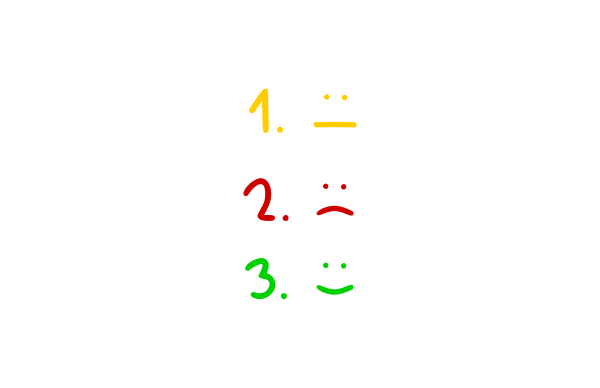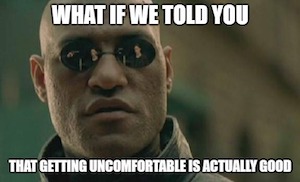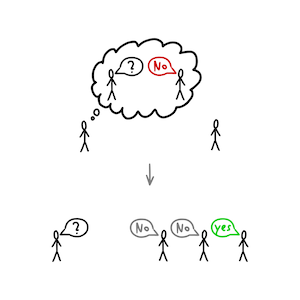What's the cost of changing yourself?

We’re not going to lie to you, change is hard.
On the whole, we prefer being comfortable, and doing things the way we’re used to.
But even when we do decide to change, we can make it harder: by expecting the change to be fast, easy, and lasting forever.
We imagine how good it’ll feel when we finally stop procrastinating, stop being addicted, or finally have the body we desire. This is ultimately unhelpful because we make ourselves feel good without doing anything.
And we also create bad expectations for ourselves.
Why am I not there yet? I’m still struggling.
Some try to motivate themselves to change by thinking about the potential benefits. This is a bit better but still, a lot of people know that if they stop eating junk food, they would lose weight and feel healthier, and yet they don’t do that. Most of the time, we know the benefits of change, but we don’t do anything.
Fewer people try to motivate themselves by asking: What’s going to happen if I don’t change? This is getting closer to seeing the whole picture. Unfortunately, a lot of people avoid asking that because it makes them uncomfortable.
However, we think there is a more important question that most of us forget to ask.
What is the price that I need to pay?
What is it going to cost me? What’s the cost of stopping this old behavior?
The behaviors we’re engaged in at the moment serve us in some way. Take the case of surfing compulsively. It’s probably making you feel less lonely, less bored, and less overwhelmed (because you can forget about work).
However, it can easily become a form of addiction and turn into spending hours and hours every day just scrolling or watching.
So the, if you want to stop surfing compulsively, this is the price:
- You might feel lonely
- You might feel bored
- You might feel overwhelmed with all the things you didn’t do
- You might feel unpleasant emotions like anger, frustration, sadness, and more.
Now, this is the price we have to pay.
However, this isn’t supposed to scare you!
No, it’s supposed to set your expectations properly.
Without knowing what’s awaiting you, you might be surprised.
Discontent, loneliness, boredom, and all the other emotions might hit you like a truck and if you’re not ready for it and know it’s going to happen, you will probably succumb, and go back to your old comfortable you.
Paying the price makes you address the real issues
One of the reasons why people surf the internet compulsively is to escape loneliness.
For example, they watch YouTube videos, get into heated discussions on Twitter or Reddit, or watch Twitch.
This scratches their itch—the feeling of loneliness. They stop thinking about it.
However, in comparison to the real-life sense of companionship, friendship, hugging or cuddling with another person, and love, surfing doesn’t get close.
When people surf compulsively, they do it to distract themselves instead of facing the real issue.
This can be just enough to get-by but the real issue stays unresolved.
On the other hand, when you have to pay the price, you will most likely force yourself to start working on it. In the example above, when you stop surfing mindlessly and realize that you’re feeling lonely, then you’ll start looking for more active ways to remedy that: reach out to someone and grab a coffee with them, go to a meetup based on a shared interest, or go on a date.
When something doesn’t hurt us as much, we don’t care about it, but when the pain becomes acute, we run to the doctor immediately. We take action. This is the process of the crystallization of discontent.
You can pay a lower price by being prepared
If you’re aware that even unhealthy behaviors like mindless surfing are serving you in some way, then you can find healthier substitutes, better ways to tackle the emotions.
Loneliness → Planning out socialization ahead, joining a group, going to a meetup, working on your social skills
Boredom → Finding new interests, hobbies, skills
Discontent → Meditating, journaling, scheduling a therapy session
The price is temporary
In the beginning, the price can seem high. Going from 24/7 over-stimulation to allowing yourself to be bored can be tough. But like many things, it gets easier.
A quote from a Japanese Samurai, Miyamoto Musashi, comes to mind:
"It may seem difficult at first, but everything is difficult at first."
Over time, boredom becomes something we appreciate, the time when we daydream something that enables us to process our emotions better.
Loneliness becomes solitude that we enjoy because we can be with our own thoughts but we can also learn to banish it by socializing in person often.
Anxiety becomes something we learn to deal with or even a guide, pointing out things that we need to do something about.
Even if the price stays high, you will see that the growth and satisfaction are worth paying it.
Are you willing to pay the price?
Do you want to change?
What’s the price you’re going to pay?
How can you prepare to pay it?


